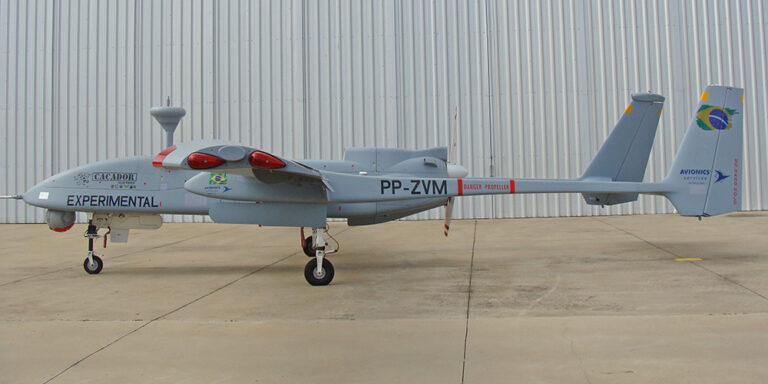30 June 2016, Botocatu, Brazil — Avionics Services S.A. officially launched its class 4 “MALE” Unmanned Aerial Vehicle baptized “Caçador” (or fighter in Portuguese). The “roll-out” took place at the Botucatu airport in the State of São Paulo (SDBK), once the headquarters of the Neiva aeronautical company, creator of many light aircraft including the Neiva Regente still in use at the Brazilian Air Force Academy in Pirassununga. During this event a retrospective of the project, the system’s capacity and information about its strong potential for use as a potent ISR platform for the intelligence tactical missions required by the Força Aérea Brasileira (FAB) was made. It also includes civilian defence, environmental protection, and agribusiness.
A flight demonstration with real-time monitoring gave the attending crowd an idea of the capacity of this drone. The Caçador is based on the Heron-1 UAV, operated by more than 20 customers worldwide and developed by Israel Aerospace Industries (IAI). The Heron-1 has been in use in Brazil with the Federal Police Department for more than five years. The aircraft has already complied with all proper regulations and obtained all permits required by the Brazilian government authorities. It is the only domestic UAV class 4 in operation in Brazil.
Among its features, the Caçador is a medium-altitude, long endurance UAV capable of flying for more than 40 hours at an altitude of up to 30,000 feet, covering a 1,000 km range. The maximum takeoff weight is 1.270 kg, allowing it to transport simultaneously multiple payloads for a variety of missions., The drone is equipped with a wide-band satellite communication (SATCOM) radio set with a practical range of over 1,000 km from its command and control station—a valuable feature, especially in the case of large countries such as Brazil.
Since the conclusion of a cooperation contract three years ago, IAI and Avionics Services have been working together to establish a strong Brazilian industrial base in the field of unmanned aerial vehicles. The contract includes a transfer of technology and know-how share in order to ensure more independence to the Brazilian industry and provide enough proficiency in the development of advanced and complex unmanned systems. Avionics Services’ infrastructure are gathered at Botucatu airport. It is hoped to become over the years a center of excellence for MALE unmanned systems.


